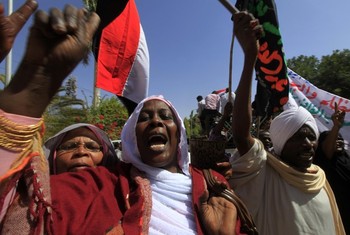Khartoum warns South Sudan against holding unilateral referendum in Abyei
August 25, 2013 (KHARTOUM) – The Sudanese government described threats by South Sudan to unilaterally hold a referendum in the contested Abyei area as “warbling away from the flock,” and a breach of the cooperation agreements.

Al-Sideeg reiterated that such move would be contrary to the UNSC call for setting up civil institutions in Abyei prior to the referendum and implementing the interim security and administrative arrangements in accordance with the June 2011 agreement. The latter provides for swift establishment legislative and administrative institutions and a police force.
On Friday the UNSC expressed its “grave concern about the highly volatile situation” in the disputed region and urged the two sides to form interim local institutions they agreed to in June 2011.
“The Council recalls their decision in Resolution 2046 that the parties must resume immediately negotiations to reach agreement on Abyei final status under the auspices of the AUHIP”, further said the UNSC presidential statement.
The 15 member body urged to disarm local communities and to turn Abyei into a “weapons-free zone” as it was previously decided by the two parties at the level of Abyei Joint Oversight Committee (AJOC).
In line with the 20 June agreement, a joint police force has to be formed along with a joint administration and a legislative council. But the two sides they failed to reach a deal on the composition of the local parliament.
The Dinka Ngok population in Abyei fears that the formation of these institutions without an agreement over the referendum would lead to perpetuation of Khartoum’s control over the region.
Last year, the African Union mediation team proposed that a referendum be held in Abyei this October, but that only those residing permanently in the area would be allowed to vote in the plebiscite, and decide whether they want to join Sudan or South Sudan.
This proposal would effectively make the majority of voters come from the Dinka Ngok tribe, aligned with South Sudan, thus putting the Arab Misseriya nomads, who spend several months in Abyei every year grazing, not part of the voting.
However, Sudan swiftly rejected the plan, which received the blessing of the AU Peace and Security Council (AUPSC).
The head of the sub-parliamentary committee on legislation and justice, Al-Fadil Haj Suleiman, announced Sudan’s absolute rejection for holding Abyei referendum in October and warned of doing so without involving the Arab Misseriya tribesmen else it would be an invalid move.
He threatened that Sudan would not recognize the results of the referendum had Juba insisted on holding it unilaterally and without involving the Misseriya.
Al-Fadil went on to accuse Juba of intentionally creating further problems and pointed that the Misseriya have acquired the right to vote as citizens of Abyei, saying that their absence from the area in certain months during the year does not justify denying them this fundamental right which was guaranteed by international conventions.
He demanded that Juba agrees with Khartoum on the appropriate time to hold it with the involvement of the Ngok Dinka and the Misseriya.
Sudan’s ruling National Congress Party (NCP) spokesman Yasser Youssef in separate statements pointed to the threats of the co-chair of Abyei Joint Oversight Committee (AJOC) for the South Sudanese side to hold the referendum in October whether Khartoum agreed or not describing it as “political talk”.
In a related issue, the union of the Misseriya tribes has reiterated its rejection for holding the referendum in October and stressed that any attempt by South Sudan to impose a “fait accompli” would be doomed to fail.
The head of the Misseriya general union, Mohamed Khater Jumaa, said in a statement on Sunday that they reject the move of South Sudan’s president, Salva Kiir of sending all Ngok Dinka tribesmen to Abyei, stressing that Misseriya will not accept a referendum in their homeland.
He warned that Kiir’s call for making the necessary preparations for holding the referendum would only trigger conflict between Misseriya and Ngok Dinka, demanding that Khartoum take similar steps to defend Misseriya rights.
On Saturday, Misseriya paramount chief Mukhtar Babu Nimir criticized the silence of the Sudanese government and cautioned that they are prepared for all eventualities including going to war.
“Our government is silent while they know everything. We are yet waiting for their reaction and if it does not move we will not accept that South Sudan organize unilaterally a referendum. We want the government to be clear with us”, he said stressing “if it fails, we will play our part in the liberation of our land in war and peace.”
Khater added that priority should be given to setting up the legislative council and the civil institutions as well as resuming efforts for peaceful coexistence between Misseriya and Ngok Dinka.
During the wartime, the Misseriya were organized in militias and fought alongside the Sudanese army against the former rebel Sudan People Liberation Movement (SPLM) that now rules South Sudan.
(ST)
